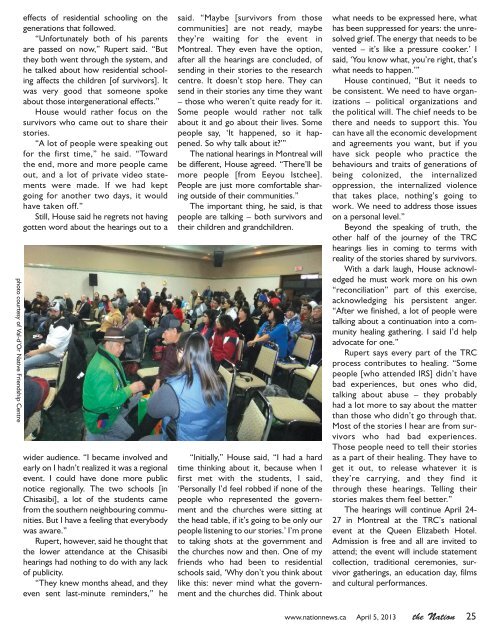Nation-20-11
Nation-20-11
Nation-20-11
You also want an ePaper? Increase the reach of your titles
YUMPU automatically turns print PDFs into web optimized ePapers that Google loves.
photo courtesy of Val-d’Or Native Friendship Centre<br />
effects of residential schooling on the<br />
generations that followed.<br />
“Unfortunately both of his parents<br />
are passed on now,” Rupert said. “But<br />
they both went through the system, and<br />
he talked about how residential schooling<br />
affects the children [of survivors]. It<br />
was very good that someone spoke<br />
about those intergenerational effects.”<br />
House would rather focus on the<br />
survivors who came out to share their<br />
stories.<br />
“A lot of people were speaking out<br />
for the first time,” he said. “Toward<br />
the end, more and more people came<br />
out, and a lot of private video statements<br />
were made. If we had kept<br />
going for another two days, it would<br />
have taken off.”<br />
Still, House said he regrets not having<br />
gotten word about the hearings out to a<br />
wider audience. “I became involved and<br />
early on I hadn’t realized it was a regional<br />
event. I could have done more public<br />
notice regionally. The two schools [in<br />
Chisasibi], a lot of the students came<br />
from the southern neighbouring communities.<br />
But I have a feeling that everybody<br />
was aware.”<br />
Rupert, however, said he thought that<br />
the lower attendance at the Chisasibi<br />
hearings had nothing to do with any lack<br />
of publicity.<br />
“They knew months ahead, and they<br />
even sent last-minute reminders,” he<br />
said. “Maybe [survivors from those<br />
communities] are not ready, maybe<br />
they’re waiting for the event in<br />
Montreal. They even have the option,<br />
after all the hearings are concluded, of<br />
sending in their stories to the research<br />
centre. It doesn’t stop here. They can<br />
send in their stories any time they want<br />
– those who weren’t quite ready for it.<br />
Some people would rather not talk<br />
about it and go about their lives. Some<br />
people say, ‘It happened, so it happened.<br />
So why talk about it?’”<br />
The national hearings in Montreal will<br />
be different, House agreed. “There’ll be<br />
more people [from Eeyou Istchee].<br />
People are just more comfortable sharing<br />
outside of their communities.”<br />
The important thing, he said, is that<br />
people are talking – both survivors and<br />
their children and grandchildren.<br />
“Initially,” House said, “I had a hard<br />
time thinking about it, because when I<br />
first met with the students, I said,<br />
‘Personally I’d feel robbed if none of the<br />
people who represented the government<br />
and the churches were sitting at<br />
the head table, if it’s going to be only our<br />
people listening to our stories.’ I’m prone<br />
to taking shots at the government and<br />
the churches now and then. One of my<br />
friends who had been to residential<br />
schools said, ‘Why don’t you think about<br />
like this: never mind what the government<br />
and the churches did. Think about<br />
what needs to be expressed here, what<br />
has been suppressed for years: the unresolved<br />
grief. The energy that needs to be<br />
vented – it’s like a pressure cooker.’ I<br />
said, ‘You know what, you’re right, that’s<br />
what needs to happen.’”<br />
House continued, “But it needs to<br />
be consistent. We need to have organizations<br />
– political organizations and<br />
the political will. The chief needs to be<br />
there and needs to support this. You<br />
can have all the economic development<br />
and agreements you want, but if you<br />
have sick people who practice the<br />
behaviours and traits of generations of<br />
being colonized, the internalized<br />
oppression, the internalized violence<br />
that takes place, nothing’s going to<br />
work. We need to address those issues<br />
on a personal level.”<br />
Beyond the speaking of truth, the<br />
other half of the journey of the TRC<br />
hearings lies in coming to terms with<br />
reality of the stories shared by survivors.<br />
With a dark laugh, House acknowledged<br />
he must work more on his own<br />
“reconciliation” part of this exercise,<br />
acknowledging his persistent anger.<br />
“After we finished, a lot of people were<br />
talking about a continuation into a community<br />
healing gathering. I said I’d help<br />
advocate for one.”<br />
Rupert says every part of the TRC<br />
process contributes to healing. “Some<br />
people [who attended IRS] didn’t have<br />
bad experiences, but ones who did,<br />
talking about abuse – they probably<br />
had a lot more to say about the matter<br />
than those who didn’t go through that.<br />
Most of the stories I hear are from survivors<br />
who had bad experiences.<br />
Those people need to tell their stories<br />
as a part of their healing. They have to<br />
get it out, to release whatever it is<br />
they’re carrying, and they find it<br />
through these hearings. Telling their<br />
stories makes them feel better.”<br />
The hearings will continue April 24-<br />
27 in Montreal at the TRC’s national<br />
event at the Queen Elizabeth Hotel.<br />
Admission is free and all are invited to<br />
attend; the event will include statement<br />
collection, traditional ceremonies, survivor<br />
gatherings, an education day, films<br />
and cultural performances.<br />
www.nationnews.ca April 5, <strong>20</strong>13 the <strong>Nation</strong> 25


